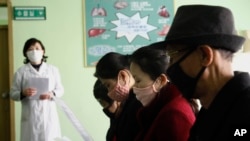U.N. experts say the COVID-19 pandemic is worsening widespread food shortages and malnutrition in North Korea, causing more hunger and ill health.
The humanitarian situation and nutritional status of millions of people in North Korea was bleak before the outbreak of the coronavirus pandemic. The World Food Program says more than 10 million people, or nearly 40 percent of the population, are in need of humanitarian aid.
WFP spokeswoman Elisabeth Byrs says even more people have no access to health, clean water, sanitation and hygiene services.
“There are also 1.7 million children under five who are also living under the threat of recurrent natural disasters, and now, the global COVID-19 pandemicو" Byrs said. "Malnutrition has been persistent and widespread, causing long-term damage to the health and development of children, as well as pregnant and nursing mothers.”
Byrs says nearly one in 10 children under five is underweight and one in five is stunted. She notes malnutrition on that scale will cause irreversible damage to hundreds of thousands of children.
The World Food Program warns preventive measures, such as quarantine also may make it difficult for vulnerable people to get the healthcare and nutritious food they need to stay healthy.
The North Korean government of Kim Jong Un has not officially confirmed any cases of coronavirus. However, in late January, North Korea closed its border with China, essentially ending trade between the two countries.
U.N. Special Rapporteur on the situation of human rights in North Korea Tomas Ojea Quintana says the action has exacerbated the food crisis and deepened economic hardships facing North Koreans.
He says an increasing number of families eat only twice a day and some are starving. Even soldiers, he says, reportedly are suffering from food shortages. But he expresses particular concern about thousands of people in secretive political prison camps. He says many reportedly are dying because of hard work and lack of food, contagious diseases and overcrowding.
The U.N. investigator is calling for the immediate release of prisoners with vulnerable conditions, who are at particular risk of infection and death from COVID-19.
Quintana also is urging the U.N. Security Council to consider lifting sanctions imposed over Pyongyang’s nuclear and missile programs. He says the sanctions are having a crushing impact on the livelihoods of people and the ability of the government to respond to their needs.




